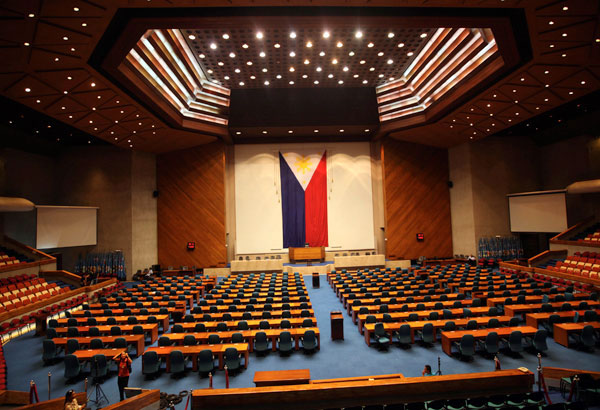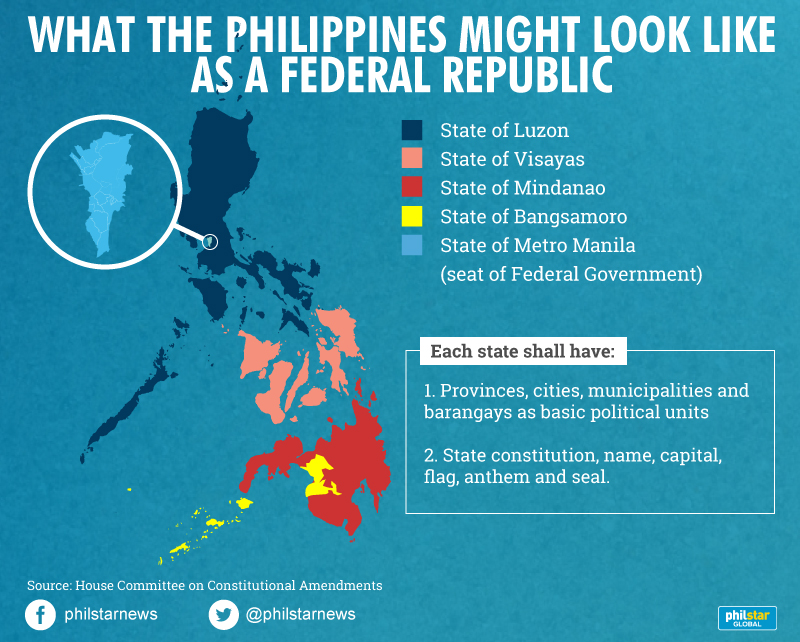LIST: Controversial features of proposed federal charter by House sub-committee

MANILA, Philippines — As Philippine lawmakers buckle down to work for the country’s shift to federal system of government, Congress cannot amend the 30-year-old constitution, which was designed to stop a repeat of dictatorship, without stirring controversies.
The switch to a federal system was one of the key planks of President Rodrigo Duterte’s election campaign. The country currently employs a unitary form of government with much of the power emerging from the central government.
According to Duterte, federalism will eliminate poverty in provinces and will provide more powers to local governments, including the power to establish courts, implement business regulations and impose taxes.
The House of Representatives on Tuesday voted to convene Congress as a constitutional assembly. If the House con-ass measure gets Senate concurrence, leaders of both chambers would set a schedule for the drafting of the envisioned federal Constitution.
However, people are divided regarding any attempts to amend the Constitution, with administration critics accusing legislators of seeking to perpetuate themselves in power, or of finding a way to extend Duterte’s term beyond 2022.
But Duterte had repeatedly said he would prefer to retire earlier.
READ: Quick Facts: What's inside the House-proposed federal charter
Below are some features of the proposed federal charter by a House sub-committee that have been generating controversies:
No Judicial and Bar Council - Under the proposal, the provision that created the Judicial and Bar Council will be deleted, effectively abolishing the body in charge of conducting careful screening of candidates seeking to fill the vacancies from the lowest to the highest in the judiciary.
Removal of power of judicial review on "grave abuse of discretion" - Citing “judicial overreach,” a portion which allows the judiciary to inquire into acts of other branches of government will be deleted.
Grave abuse of discretion refers to arbitrary or despotic exercise of power amounting to lack or excess of jurisdiction.
Limiting protection of free speech - Without giving a clear explanation on what qualifies as “responsible,” the proposed federal charter wants the law to only guarantee “responsible exercise” of the freedom of expression.
“The right of free speech, or any right enshrined in the Bill of Rights, comes with an equal burden of responsibly exercising the same,” the House sub-committee’s proposal read in part.
“The exercise of one’s rights must be done with good faith and reasonable care,” it added.
Amendments in “Human Rights” sub-title - The proposed federal charter also seeks to “delete” Article XIII, which contains provisions on social justice and human rights.
The provisions in Article XIII, however, will be transferred to Article II, which lists the Declarations of Principles and State Policies.
On the Human Rights sub-title of Article XIII, all provisions will be retained except in “paragraph 1,” which states that the Commission on Human Rights is mandated to investigate human rights violations regardless of whether such abuses were committed by a government or non-state party.
No love - The word “love” will be deleted from the preamble because “it has no place in a Constitution.”

The issue of amending the Constitution is a sensitive topic in the Philippines, a country once under Marcos dictatorship for two decades, over fears that it will be used to prolong the term of the chief executive.
A move to amend the charter during President Gloria Arroyo's term was met with protests as concerns that it was intended to extend her term loomed.
Related video:
- Latest
- Trending


























